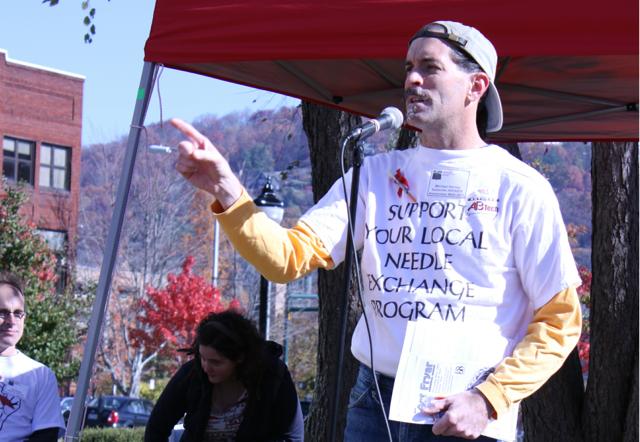a href=”“Whenever someone asks Michael Harney how he stays out of jail, he knocks on wood.
Harney operates the Needle Exchange Program of Asheville, which distributes some 1,500 to 2,000 sterile needles in the community each month. Such harm-reduction programs are illegal in North Carolina, notes Harney, "even though there are all sorts of studies and research and data, nationwide and internationally, showing it to be an effective HIV and hepatitis C prevention strategy."
And when people hear that Harney risks incarceration, they often wonder why. "I'm not a needle user, never have been," he explains, adding, "It's part of my job. I feel like it's a need in the community that is not being met, and if I don't do it, who will?"
Besides needles of various sizes, NEPA provides other sterile materials for injection. "We have things like tourniquets, cotton as a filter, cookers, sterile water, alcohol swabs, antibiotic ointment and Band-Aids. We always put some literature in the bags about how to clean your own needles if you have to use your own needles again. … We also give some information to local treatment centers."
Currently, only 4 to 8 percent of new HIV infections in North Carolina come from needles. Still, even one HIV infection is prohibitively expensive.
"The total lifetime cost of an HIV infection, as suggested by the N.C. Department of Health and Human Services, is somewhere in the neighborhood of $300,000 to $400,000 per person," he explains. "Using a needle or syringe that costs 15 cents or a dollar sure beats paying for a new infection when we know the prevention tools work."
In 2009, the Obama administration lifted a 20-year ban on using federal money for needle-exchange programs. But the move did not create any new funding for these programs and left it to the states to determine their legality. Harney says there are believed to be four other needle-exchange programs in North Carolina, but they’re either relatively inactive or operating underground.
NEPA, however, was open about what it was doing when it started in 1994. "We claim to be the only openly active needle-exchange program in the state of N.C.,” he continues. "We've let every governor know that we're operational. We've let all the mayors know locally, and the chiefs of police."
Both the community and local law enforcement have generally been supportive of the program, notes Harney.
"Even though it's against the law and they have to uphold the law, it's been our understanding that they have plenty of work that they're doing. They don't have to come looking for us, so we don't make them intervene. That's why we're not standing in the middle of the street doing needle exchange: First of all, that would put us at risk, but it would also put our participants at risk."
When someone tries to buy needles without a prescription, Harney sees an opportunity. "In terms of public health, it would be beneficial if pharmacists would agree to provide some access to clean needles. … Maybe they could agree to speak to the person who didn't have a prescription and say, 'Look, I don't know what you're using these for, but I want to go over with you some safety tips about needles.'"
The debate concerning needle-exchange programs, he maintains, is not about their effectiveness but about morality. "People say you're increasing drug use, or you're promoting drug use, but we already know people use drugs. They get up in the morning using drugs: coffee, cigarettes and chocolate. We're a drug-using world: It's just we don't like the drugs that people sometimes use by injection."
To Harney, people judge intravenous drug users too harshly. "We need to figure out how to share this space and place called Earth and see each other's humanity,” he asserts, “even if you use a needle or drink alcohol or speak another language, or you're homeless or you're rich or you're poor. Whatever you are, you're still a human walking on this Earth."
Needle-exchange programs, he argues, deal with drug use realistically and without judgment. "Drug use is widespread for a lot of different reasons," he points out. “Sometimes people get hooked on drugs; sometimes they don't know a way out. And sometimes they need a little hope — and that's what a needle-exchange program can do. We can say, 'You're still human, we still love you, and let us know what we can do.'"
NEPA relies on private donations and volunteers. And while advocates push for legalizing needle-exchange programs, Harney says his organization will continue business as usual. "We do what we can to provide the sterile injection equipment and take back needles and dispose of them properly, so they're not in the trash cans or thrown in the streets and parks. We want to reduce harm to the community."
— Megan Dombroski is a senior journalism student at UNCA and an editor at The Blue Banner, the student newspaper. Send your health-and-wellness news and tips to mxhealth@mountainx.com.




Excellent, heroic even.